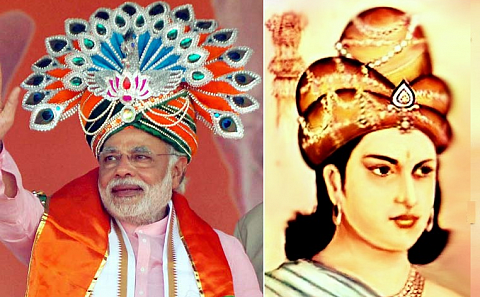In the run-up to the Assembly elections in Bihar, the BJP has found a new historical figure to hijack. Since December last year, the Bihar BJP has run a concerted campaign to link Mauryan Emperor Ashoka with the Kushwaha community in Bihar, and valorise Ashoka’s identity for political leverage.
Historical Inaccuracy
The BJP’s campaign to appropriate Ashoka as a nationalist figure belonging to the Kushwaha community began late last year when members of the party participated in the Chandragupta Rajyarohan Samaroh organised in Patna by the All India Rashtrawadi Kushwaha Parishad.
At this event, Bihar BJP leader Sushil Kumar Modi reportedly said that Kushwahas were the descendants of Chandragupta and Ashoka and they should resolve to vote for the BJP to restore the glory that their community had during the reign of Mauryan emperors.
Several historians have hit out at the BJP for having no historical basis.
The Mauryan Empire started with Chandragupta Maurya, Ashoka’s grandfather. It is believed that the Brahmin master strategist Kautilya, also known as Chanakya, played an important role in his usurpation of power from the Nandas.
We cannot be sure what Chandragupta Maurya’s lineage is. Buddhist sources of later years state he was the son of a chieftain of a Kshatriya clan called the Moriyas of Pipphalivana, possibly in the Himalayan foothills. Jain texts state that he was the son of the headman of a village of peacock breeders, or mayura-poshakas.
What we know for sure is that they were from the eastern Gangetic plains. So it is nearly impossible to state which caste or clan the Mauryas belonged to with any historical certainty.
It is believed that Asoka was a great administrator, but was cold-blooded in his early years, later turning into a Buddha-embracing pacifist. By the time he died, Ashoka was a Buddhist, and that pretty much defined his later years as a ruler.
‘The Civilization Party’
BJP’s sudden love for Emperor Ashoka is no doubt couched in their lust for Bihar Assembly Seats, and it fits in perfectly with the party’s image.
The BJP is a civilisational party, whichever entity helps them bolster their construct of India as a great civilisation, they will use it.There is no doubt they are doing it keeping in mind the Bihar polls, but this is at best symbolic. Perhaps Upendra Kushwaha can get them more votes than Ashoka.
-Sankarshan Thakur, senior journalist
Modi has a lot in common with Ashoka, like his proclivity for propaganda and putting state’s administration above all else, and being available to his Ministers even at odd hours. But if the BJP is serious in its appropriation of Ashoka, here are a few things those sitting at its headquarters in Ashoka Road could learn from the Emperor.
Ashoka gave a humanistic orientation to governance, which was a significant departure from Arthashastric- administration. To propagate dharma, Ashoka used the dual strategy of legislation and persuasion, but believed that persuasion was more effective.
If we have to go by the last Parliament session, apparently persuasion is a lost art within the BJP. He was also an advocate of ahimsa in word, deed and thought. Conduct mattered to him more than faith, and he disapproved of superstitions and wasteful rituals. And perhaps the most important lesson from the of Ashokan era is that social engineering makes governance and administration difficult, and will lead to the eventual decline of the empire.
(Ramanthan S writes for The News Minute)
Historical facts attributed to ‘Gem in the Lotus’ by Abraham Eraly.
(At The Quint, we question everything. Play an active role in shaping our journalism by becoming a member today.)
